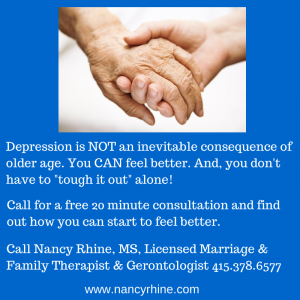older adults
Successful Aging Takes a Team!
Successful Aging Takes A Team!
Let’s talk about why it’s critical to their quality of life to have a strong support team around seniors who are growing older.
Why?
Because I see so many older people in my private practice who face, for example, situations where they are grappling with:
- family members or loved ones with very strong opinions about what is best for them – opinions danabol that may or may not be informed and wise
- *no* family members or close friends at all to advocate for them
- a primary care physician who is prescribing medications but not following them in after-care. What is known as the “diagnose and adios” routine.
- a specialist or two who is also prescribing – say for instance a cardiologist or endocrinologist – but who is not tracking the interaction of *all* of the medications involved
- a psychiatrist who may be also be treating and prescribing psychiatric medications
- possibly a nutritionist, alternative health practitioner or two prescribing supplements, vitamins and minerals which may all be fine but which also carry side effects that can contribute to mood problems.
Way more often than not, there is very little, if any, communication and coordination amongst the health professionals. This coordinator function may have been done in the past by the primary care doc who managed the broad perspective overview of how each of his patients were doing. But nowadays primary docs are under so much time pressure in their practices that they just do not have time take on this role.
In order to build that coordinated team which will support an individual’s successful aging, it takes someone stepping into the role of being a skilled ADVOCATE. A person who knows how to coordinate effective communication amongst team members and who is in charge of reaching out on behalf of the patient to represent their concerns. Someone who can help the patient communicate their concerns and questions to other team members, and who also helps the patient remember the answers and instructions of doctors. Team members need to work in concert with each other, supporting the various lens through which each patient is viewed.
All of this process needs to be done with the utmost RESPECT for each patient where the patient has TRUST in the advocate that he or she is representing the wishes of the patient towards the goal of the best possible quality of life at any stage.
Gerontologists and mental health professionals who understand the importance of building good communication and coordination amongst care teams can be invaluable to the patient and family. Sometimes, it is care managers who provide this role, sometimes it’s an adult child, and sometimes it’s gerontological counselor.
Whoever it is that takes the lead in this role, a support team that is identified, built, coordinated and in good communication, will result in a patient who is much more likely to thrive and much less likely to fall through the cracks.
This is the health care situation for older people in our country today. Just the facts. And totally doable to navigate through it successfully. With help. With a solid, caring team.
Depression is NOT inevitable in older life.
 Our youth-oriented Western culture seems to tell us that we are all doomed to succumb to debilitating depression as an inevitable part of growing older. This is not true!
Our youth-oriented Western culture seems to tell us that we are all doomed to succumb to debilitating depression as an inevitable part of growing older. This is not true!
Sure, it is true that getting old “ain’t for sissies” as Bette  Davis famously put it. There are a myriad of challenges that confront us. Nobody would argue that! We know what those challenges are – all kinds of changes, losses of various sorts from little things to profound ones, aches and pains, the gamut.
Davis famously put it. There are a myriad of challenges that confront us. Nobody would argue that! We know what those challenges are – all kinds of changes, losses of various sorts from little things to profound ones, aches and pains, the gamut.
But, you can also thrive in later years. It’s about your mindset, your emotional and spiritual practices and your strong support network. The kids called support networks these days, their “posse”. Your posse can be made up of old and new friends, your peers, support group members, family, pets, counselors, trusted doctors and spiritual advisors.
Generally, people like you have an assortment of healthy, tried-and-true coping skills that have gotten you this far in your life. Perhaps now, however, you are encountering an accumulation of situations that tax those skills. It may be time to remember your old skills and to learn new ones. It may likely be time as well to rethink your life’s purpose. Purpose is key to keeping your mood up and your heart content.
What stands in the way? Well, too many times, that old Shame rears its head and tells you that you ought to be able to figure this out on your own, that you ought to be able to just “tough it out” and do it alone or else you’re weak. You can’t burden your children so what to do? As the blue box here says, don’t keep it bottled up inside!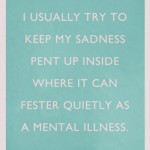
What people often don’t realize is that you are not alone in feeling challenged, stressed, confused, overwhelmed or anxious. These feelings surface when we are going through new phases and transitions in our lives. It’s during these times that it becomes so important to realize you don’t have to reinvent the wheel. There are many practices and tips for how to increase your enjoyment of life in older years.
The important thing is to not give up and figure that just depression goes with the territory. That may be what society tells you, it might be the prevailing attitude. But it is not true. Reach out for help. Counseling and support can turn your life around and help you reclaim your confidence, solid footing and peace of mind. Isn’t it worth a try? What have you got to lose!
Whistlestop – 60 Years and Getting Even Better!
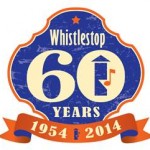 Whistlestop is Marin County’s largest and oldest senior service agency. 2014 marks Whistlestop’s 60th anniversary. In 1954, a grass roots community group decided to band together to make sure their elders were not forgotten. This was before the time of senior centers, considerations for people with disabilities, or specialized transportation. They
Whistlestop is Marin County’s largest and oldest senior service agency. 2014 marks Whistlestop’s 60th anniversary. In 1954, a grass roots community group decided to band together to make sure their elders were not forgotten. This was before the time of senior centers, considerations for people with disabilities, or specialized transportation. They 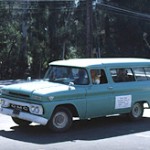 started the Marin Senior Coordinating Council (aka Whistlestop), a non-profit agency dedicated to providing creative programming, helpful advice and administrative services to other organizations serving seniors. Over time, Whistlestop has grown to become the primary local provider of:
started the Marin Senior Coordinating Council (aka Whistlestop), a non-profit agency dedicated to providing creative programming, helpful advice and administrative services to other organizations serving seniors. Over time, Whistlestop has grown to become the primary local provider of:
- paratransit and subsidized transportation services for older and/or disabled citizens in Marin (60 vehicles, 500 trips a day plus subsidized taxi vouchers)
- Meals on Wheels (to over 250 homebound adults each week)
- a rapidly expanding range of classes, support groups and events in the Active Aging Center
- the hoppin’ Jackson Cafe – a collaboration with Homeward Bound of Marin’s Fresh Starts Culinary Academy. Delicious meals are prepared by culinary students and served by our awesome Whistlestop volunteers.
Whistlestop is where I served one of my Counseling Psychology internships while in graduate school. I was blessed to be able to help facilitate the long-running and popular Seniors Circle Wednesday drop-in support group which brought me to Whistlestop every week. Once that began, I saw firsthand what a tremendous resource Whistlestop is for Marin seniors and also what potential it has to do more. 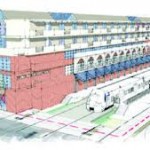
Now Whistlestop is about to undertake an expansion campaign called Whistlestop 2.0 to provide even more rides, meals and services, plus some affordable apartments in a state of the art, beautiful living center. With Whistlestop’s prime location near shops, cafes, theaters and even the soon to be completed Smart Train, and with Marin being the fastest aging county in California, the timing of this project couldn’t be better!
I am proud to serve as an Executive on Whistlestop’s Board of Directors. See announcement in the newsletter below. Whistlestop Express March 2014. To kick-off our fundraising campaign and to celebrate our 60th Anniversary we are holding a huge party at Rancho Nicasio on September 28th, 2014. Join us! 
“How Therapy Can Help in the Golden Years” – wonderful NYT article
Psychotherapy with Older Adults – Recognition in the Mainstream Press – Finally!
This article appeared today on the front page of the New York Times. I am so heartened to read the stories, watch the video and listen to the audio clips with seniors who are benefiting from trying out talk therapy with compassionate and competent psychotherapists.
I think it’s important to emphasize the value shop anabolics online of finding someone you feel comfortable with, someone you can trust. Life is too short, especially in older years, to spend in therapy with anyone you don’t feel is kind, understanding and, at the same time, professional.
Read the whole article by clicking on the link below.
Volunteering as Older Adults – Why Is It a Good Idea and Where Can I Help?
Volunteering is good for our health.
Regular reports in local newspapers and publications extol the great contributions of Marin’s many individuals who generously volunteer their time and leadership skills to help local organizations.
A report published by the Marin Community Foundation entitled “Volunteering by Older Adults in Marin County: the Impact on Volunteers and the Organizations They Serve”, read:
“Older adult volunteers represent a significant resource that nonprofits can leverage during a time ofdecreased funding and increased demandfor services. Marin County’s growing population of older adults is rising to meet this increase in demand for volunteers.”
What may be less known, however, is how beneficial the practice of volunteerism is to the health and wellbeing of the volunteers themselves.
According to the MCF report, the following are some of the major benefits to older adults of serving as volunteers in their communities:
1. Enhanced sense of purpose and self-worth. Contributing wisdom and know-how based on past careers, special interests, experience and life lessons leaves volunteers with a sense of satisfaction and of being valued.
2. Improved mental and physical health. Over half of older adult volunteers report that volunteering contributes moderately or significantly to their physical health, helps them feel significantly better emotionally and “keeps their minds sharp.”
3. Increased confidence in one’s ability to make a difference in the community. Older adult volunteers emphasize how fulfilling it is to use their time, skills and experience to make differences in their communities.
4. Greater social support and community involvement. Volunteering helps most people feel more connected to their communities.
5. Exposure to new experiences and perspectives. Meeting new people, sharing skills, and hearing life stories leads to changing perspectives about community groups and issues.
6. Increased connection to younger generation. Older volunteers emphasize how energizing and valuable it is to spend time helping out younger people and feel that they are making a positive difference in these young folks’ lives.
Where Can I Go To Volunteer My Help?
This is easy to find out in Marin. We are fortunate to have Volunteer Marin, a program of Marin’s Center for Volunteer and Nonprofit Leadership. Founded in 1965 as the Volunteer Bureau, the Center has been building the capacity of volunteers and nonprofits for over 40 years.
If you are Internet savvy, it is simple to log in to a very cool tool: www.VolunteerMarin.org. Once on their home page, click on “Opportunities”. You will see a calendar of all kinds of opportunities, organizations, locations, dates and times that way.
You can also do wonderfully fruitful, customized searches by specifying your specifics and preferences, such as:
- your location, and how far you might be willing to travel
- your weekly schedule; what dates you are and are not available
- what kinds of things you would like to do, for instance:
-
- work with a particular organization
- address a specific issue area, like arts, education, health, hunger, environment, or justice.
- apply your special skills such as administrative, counseling, animal services, education, or construction.
- specify what kinds of people you’d like to serve, such as age, gender, ethnic group, LGBT, veterans, families, or visitors.
- select types of activity
- choose upcoming events that need volunteers
-
I tried out the Volunteer Search Tool and entered a stipulation that volunteer opportunities be within 10 miles of my home in Mill Valley. Up came 120 different interesting opportunities for volunteering at great organizations, including:
- The Redwoods
- The Audubon Center & Sanctuary
- The Marine Mammal Center
- Project Coyote
- Hospice By The Bay
- Marin History Museum
- Fair Housing
- Marin Art & Garden Center
- Marin School Garden Network
- The Bay Model
- The Civic Center
- and more
Doing things like…
- tutoring kids
- serving as a tour guide or docent
- taking care of injured animals
- coordinating cultural and entertainment events
- visiting the dying
- serving hot meals to the homeless
- designing web site and marketing materials
- doing historical research
- reading stories to children
- managing a website
- leading arts groups
- working with autistic children
- and so much more
For those of you who are unable to access Volunteer Marin online, you can contact them on the telephone through their parent organization, the Center for Nonprofit and Volunteer Leadership at415-479-5710.
In this time of decreasing funding for excellent causes, and increased need by our fellow citizens, consider helping out and doing yourselves a favor, too. Try becoming a volunteer.
Another Great Resource in Marin for Aging in Place
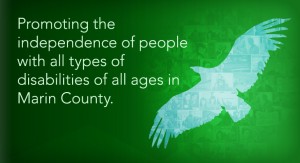 The Marin Center for Independent Living
The Marin Center for Independent Living
As we’ve been hearing, by 2020, the population of older adults in Marin will almost double. This statistic is based on findings in the Marin Community Foundation Publications: “Report on Services of Older Adults in Marin” and “A Portrait of Marin.”
Older adults in our county vary greatly in their economic levels, education, physical abilities, health situations and access to family support. One thing is certain, though, and that is that almost everybody faces or will face a time when they are looking for help.
The Marin Center for Independent Living (MCIL) is an amazing local nonprofit agency dedicated to empowering our Older and/or Disabled Adults to live rich, independent lives in their own homes. MCIL provides a wealth of information, peer support and an in-depth Personal Care Attendant Registry.
MCIL was founded in 1979, organized by a group of dedicated volunteers, following the world changing movement for disability rights begun next door in Berkeley in the 1960’s. It does not charge for its services.
MCIL runs an elegant and simple to use online matching service to help people find carefully screened, competent and compassionate local caregivers – it’s called QuickMatch.org. There are customizable search preferences so consumers can hone in on caregivers’ specific skills, availability, trainings/certifications, and work experience.
MCIL’s Personal Care Attendent Registry is important to know about because: using a for-profit home care agency, a consumer’s current cost for private home care in Marin can average about $60,000/year* (for 44 hours of care/week). The for-profit agency manages all the details for you and charges you for that service.
However, using MCIL as your guide, support and screening agency to directly employ your own caregivers can save you a significant amount of money. For the same 44 hours/week, using MCIL registry caregivers, your cost would average about $40,000/year. This is a wise choice to know about and to consider when you are weighing your options.
In addition, MCIL provides information and support on a full range of topics including:
- assistive technologies
- benefits planning
- personal care and coping skills
- financial management
- household management
- home modification
- housing assistance
- individual advocacy
For more information, go to www.marincil.org or www.quickmatch.org or call them at (415) 459-4265.
*National Clearinghouse for Long Term Care Information, U.S. Department of Health and Human Services: Planning for LTC. Date accessed, January 18, 2012.
*U.S. Department of Health and Human Services National Clearinghouse for Long Term Care Information, 10/22/08.
Neighbors Helping Neighbors: Online Community for “Tweeniors” and Older Adults in Marin
Neighbors Helping Neighbors: Building an Online Information/Community Hub in Marin
Prior to my career as a Marriage & Family Therapist, and gerontologist, I was involved in starting and growing several online communities. I have seen the tremendous benefits to individuals of a well-organized online information hub focused on the needs and interests of a particular demographic or special interest group.
This type of Online Information Resource Center assembles links, reviews and articles in an easily searchable, Central Hub to provide ease-of-use and convenience to the target population. I think we need such a Hub in Marin.
A vibrant, free, online information hub focused on older adults, adult children of older parents, baby boomers, “tweeniors”, and sandwich generation-ers – focused on life in Marin – would link Marinites up to the rich range of excellent resources, services, service providers, products, agencies and activities we have right here in our own backyards.
Plus, we would be able to share with each other how we have solved the wide variety of challenges and successes that come with growing older in general and in our local communities. We participants could serve as a kind of living encyclopedia of help and answers and ideas. Which leads me to the topic of…
Social Media (Online Community) Building Friendships
What we now call social media and used to call online community is a central part of such a community and demographic-focused web site. Members will come, attracted to the information resources, and stay, becoming participants, because of the supportive and interesting community of others with similar concerns and interests. Support and bonds and connections and friendships grow.
There are many examples of successful online communities which offer wonderful stories of mutual support. Some of you may remember The WELL (Whole Earth ‘Lectronic Link) which started in Sausalito in the 1980’s as a pioneering and legendary online community affiliated with the Whole Earth Review magazine. The WELL is still thriving and some of its members have been friends online now for 25 years. Dupont Circle Village offers a thriving senior online community as part of its Village membership in the DC area.
Older Population Thriving & Online Too
We are the fastest aging county in California. The fastest growing part of our population is the 85+ age group. Older people are turning to social media tools in droves. Something like 18,000,000 U.S. Facebook users are 55 and older.
For those older people who are not online, some simple and gentle classes and instruction would introduce them to the potential benefits of learning how to access resources and friends/family. I believe it would be empowering for them to at least have the opportunity to make an informed choice about whether the tools are for them or not.
Help! How Do We Find Answers?
The main complaint I hear from older people and their adult children or other loved ones is that they have an extremely difficult time finding answers and help for the dilemmas they are facing. They don’t know where to turn and when they do find phone numbers, they encounter what feels like a land of endless voice mail.
Many older people end up going to the ER’s with problems that would have been easily preventable if they had had help, knowledge, answers and support earlier on.
Isolation is a Major Health Issue
In addition, isolation becomes a tremendous issue for our older people as they experience vision impairment or physical conditions that prevent them from driving. Their worlds start to shrink.
We are blessed to have Whistlestop Wheels in Marin but it is important to note that Whistlestop is ADA paratransit – thus it is not senior transit – it is disabled transit with a rigorous screening process.
Isolation affects so many quality of life issues for seniors – it can lead to loneliness and depression, decline in cognitive capability and even lead to poor nutrition if the individual has no easy access to groceries and little inspiration to eat well-balanced meals.
An Invaluable Tool in Communication Toolkits
Vibrant online communities can provide a bridge between homebound people, give answers to those who are looking for ideas and shared personal experiences, referrals and tips for places to go for help, and friendly connections that can grow into friendships.
Experienced managers train volunteer moderators in conversation and group facilitation and various writing and administration tools. Online policies are crafted, posted and enforced to prevent scam artists from taking hold. Webinars and a host of free online classes can be offered.
Neighbors Helping Neighbors: An Online Information/Community Hub
As our federal, state and county budgets decrease, and at the same time our population is aging (“the Silver Tsunami” we’ve all heard about), what will be our plans for taking care of ourselves as we grow older? Will we choose to “age in place” or, as its being referred to now, “age in community”?
Will we need to look after each other along the lines of what our parents and grandparents did in smaller towns and closer-knit neighborhoods across the country?
Many people think so. There is a growing Village movement across the US and a growing NORC movement (NORC = Naturally Occurring Retirement Communities). These movements represent efforts by thousands of people in hundreds of communities to come up with ways to support each other as we get older.
We in Marin can also look out for each other as we grow older. We only need a will to do so. As I wrote last week for the Patch, the Mill Valley Village will join the group of 4 other Marin Villages (Ross Valley, Homestead Valley, Tiburon/Belvedere and Sausalito) later this year.
As we come up with a variety of ways to help each other out, we will benefit from a full use of a variety of communication tools to help us connect and collaboratively develop answers and support:
- face to face events to facilitate information exchange and relationships
- telephone help lines staffed by live operators
- an up-to-date central online information resource hub on aging in Marin
- vibrant and thriving grassroots online communities that offer us the ability to connect, form and maintain strong and caring relationships
Anybody else interested in exploring these possibilities? I’d love to hear from you!
Are We Giving Up on our Oldest Adults Benefiting from the Internet?
The Digital Have-Not’s – Our Oldest Adults – Closing the Gap
(Click on the link above to read a good summary of this issue written by blogger Laurie Orlov.)
Are we as a society just giving up on the 75+ age group as far as encouraging and teaching them about the valuable information, tools, and community they can find online?
People point out there is scarce funding to reach these people – they are the digital have-not’s. I think they are the digital “would be’s” if there were helpers to teach them about the benefits (connection with friends and family, health information, interesting stories, etc.) of online and to teach them how.
Locally-focused online communities focused on aging, grassroots reviews leading to accountability of service and product providers, social connection, information-sharing… this has to be one answer. Again, with some help to teach how.
What Do We Call Ourselves as a Group as We Get Older?
What do we call ourselves as a group as we get older? Seniors? Elders? Crones? Older adults? Geezers? Will baby boomers always just be called baby boomers? What else can we call ourselves when referring to our demographic cohort? Here’s a good article on this called Elderly No More from the New Old Age Blog which is such a wonderful blog on aging.
Questions to Ask Your Doctor – About Being Empowered As a Patient
Here is a list of questions you can draw from when you or your loved one goes to see the doctor. I hope they are of use to you. – Nancy
————————————————–
This first section is written by Sagar Nigwekar, an internal medicine physician, and Jim Sutton a family practice physician assistant.
Top 5 Questions To Ask Your Doctor
1. How will I know that my treatment is working?
2. How will the medication or treatment you are prescribing treat my condition?
3. Is there more than one condition that could be causing my problem?
4. What exactly is my condition, and what caused it?
5. What symptoms should I look for that means I should contact you or seek immediate help?
Additional questions to consider asking:
Are there treatment choices that don’t involve medications?
How long will it take for me to feel better?
If my symptoms get worse, what can I do on my own before I see you?
Is my medical condition permanent or temporary?
Questions You Should Ask About Your Medications
Any time you are prescribed a medicine you should ask these questions:
Can I take a generic medicine or is this available over the counter?
Can you review my instructions with me?
At what time should I take this medication?
Should I take it with or without food?
Can I take it with other medications?
What are the possible risks and side effects of this medication?
What is the reason for taking this medication, and how does it work?
Will this medication interact with any other medication I am taking?
Additional questions to consider asking
Can my medication be stopped suddenly or does it need to be stopped slowly?
Do I need to follow any restrictions (alcohol, driving, and work)?
Do you think a pill box will help me?
How long will I need to take my medicine?
If I do not tolerate this medication then what are my alternatives?
What should I do if I miss a dose?
Where do I store this medication at home?
——————————————————————————————————————-
This next part is based on an article by Ginny Dillon, a business development consultant for hospitals and health care in Dallas/Fort Worth:
Physicians are under pressure to see patients in a timely, effective, and efficient manner. Take a little time, organize your thoughts, come prepared and your visit could be much more productive.
What to bring with you to your doctor’s appointment:
Pad and pen… you will likely receive recommendations and many patients forget them as soon as they leave the office.
A list of your medical problems
A list of your medications
A list of your prior surgeries
A copy of pertinent studies (MRI, X-ray, etc)
A copy of pertinent medical records (valuable for second opinions).
Dress appropriately. The physician will need to see the area of concern.
Organize your thoughts. A new orthopedic history (questions your doctor will ask you) may include:
When did the problem start?
What were you doing?
Have you started taking any new medications?
Have you changed your exercise program?
What makes the pain worse?
What makes the pain better?
Do you have pain at night?
Does it awaken you?
Any numbness, tingling or weakness?
Any morning stiffness?
Pain getting up from a seated position?
Pain walking on hills?
Shoulder patients consider what motion causes your symptoms.
Do you have any mechanical symptoms (catching, locking, clicking, etc)?
Do you have any instability (does the joint feel loose)?
Do you have any swelling?
How does the pain affect your quality of life?
What have you tried so far to obtain relief (physical therapy, injections, medications, exercise, etc)?
After the exam and discussion of the findings, your doctor will likely present you with alternatives. Here are some questions you can consider asking at this point in your visit:
What are the possible diagnoses?
Is further testing necessary (If the test will not change the plan of care, then it is possible that you do not require further tests)?
Is an MRI or expensive imaging necessary (many times it is not)?
What are the non-surgical, surgical alternatives available to treat my condition?
What are the possible risks, side effects of the treatment?
What will happen if I choose not to have surgery?
What does the literature or research recommend (many physicians still practice based on anecdotal experience [which might be appropriate, depending on the situation])
Here are some specific considerations for surgical patients:
What are reasonably forseeable risks of the surgical procedure?
What are the realistic goals of the procedure (relief of pain, functional improvement, etc)?
What is my “expected recovery time” (recovery means different things to different people… be VERY CLEAR about your goals)
When can I use my arm/leg?
When can I l use my arm/leg for activities of daily living?
When can I use my arm/leg against resistance (lifting objects or putting weight on your leg)?
When can I drive?
Do you know what I do for a living? When can I return to work?

